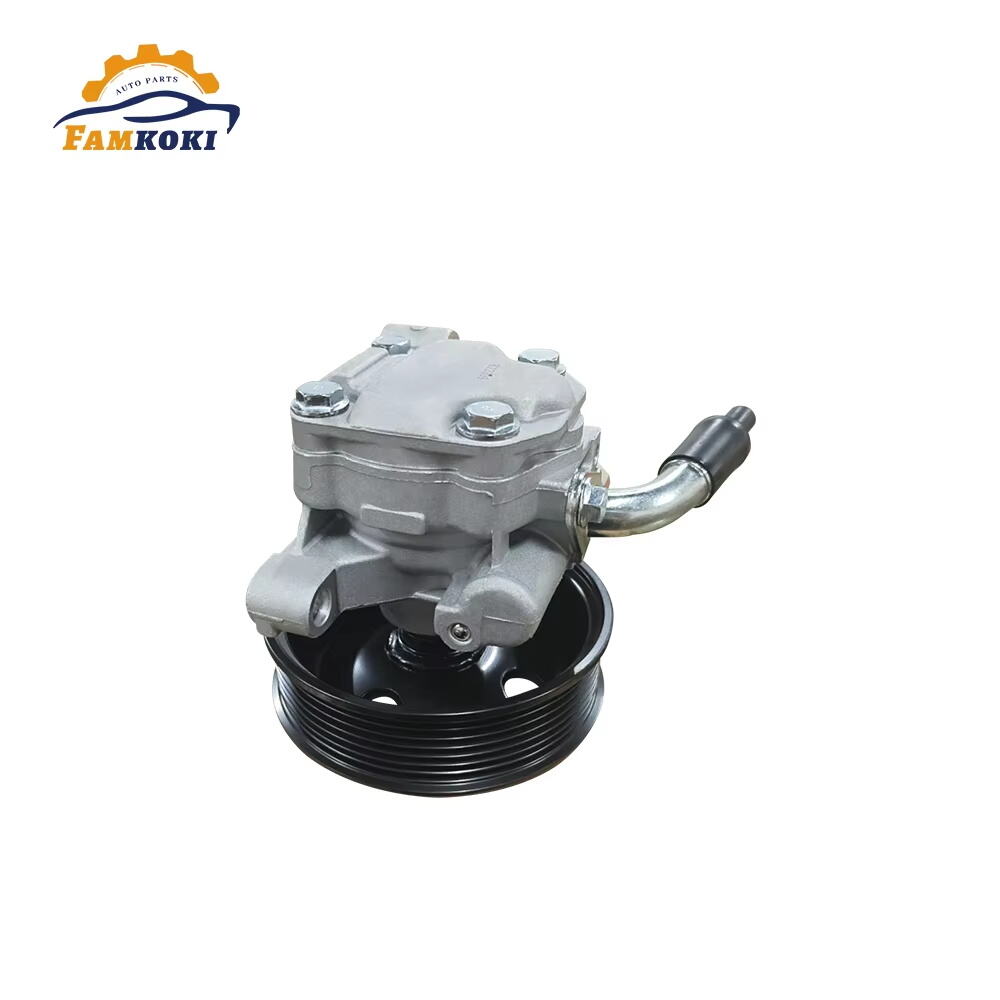Understanding the Role of a Power Steering Pump
How Power Steering Pumps Enhance Vehicle Handling
Power steering pumps play a vital role in enhancing a vehicle's handling by reducing the effort required to steer, thereby enhancing driver control. This reduction in effort is achieved by using hydraulic pressure to assist the driver when turning the wheel, which means less physical force is needed even when maneuvering in tight spaces. The feedback mechanism from the wheels to the steering system improves responsiveness and allows the driver to have better control during turns. Statistically, vehicles equipped with power steering pumps boast increased handling capabilities. For instance, they often exhibit reduced degrees of turn radius, offering more precise handling. This ease of maneuverability is particularly noticeable in urban driving environments and when navigating crowded parking spaces. In essence, the integration of power steering pumps translates to a more comfortable and responsive driving experience.
Key Components and Hydraulic System Basics
A power steering pump's functionality is deeply rooted in its integration with the vehicle's hydraulic system, which includes hoses, fittings, and steering gear. This system works collaboratively to ensure smooth and efficient operation. Understanding hydraulic principles, such as Pascal's Law, is essential in assessing how these systems generate and distribute pressure throughout the steering components. Power steering pumps are typically engine-driven via a belt, making them integral to overall vehicle efficiency. This design results in power steering systems that are highly effective, ensuring that the steering is not only effortless but also responsive. By minimizing resistance on the steering wheel, these systems significantly contribute to vehicle performance, making the act of steering seamless regardless of speed or road conditions.
Assess Your Car's Specifications and OEM Requirements
Matching Pump Type to Vehicle Make and Model
When replacing or upgrading your power steering pump, identifying the correct pump type is crucial for optimal performance and vehicle handling. Different vehicle models may use different pump types, such as rack and pinion or recirculating ball. Most manufacturers supply specific guidelines, including the model year and engine type, to help you find the right pump. Utilizing tools like the Vehicle Identification Number (VIN) can be highly advantageous in this process, streamlining the selection to ensure your pump perfectly matches your vehicle's specifications.
Decoding OEM Guidelines for Optimal Compatibility
OEM (Original Equipment Manufacturer) guidelines are designed to ensure vehicle components fit and function as intended. Following these guidelines when selecting power steering pumps can significantly enhance performance and longevity. Understanding OEM part numbers can make finding suitable replacements easier while adhering to these standards may reduce premature wear, as supported by a recent survey indicating improved vehicle life span. Thus, awareness and adherence to OEM guidelines are vital for maintaining seamless vehicle operations and maximizing your vehicle's performance and durability.
Types of Power Steering Pumps: Features and Applications
Hydraulic vs. Electric Power Steering Pumps
Hydraulic power steering pumps have long been a standard in traditional vehicles, offering robust assistance by utilizing pressurized fluid. These pumps excel in providing a more strengthened steering feel, which is invaluable in larger, heavier vehicles. In contrast, electric power steering pumps are gaining popularity, especially in electric and hybrid vehicles. They enhance fuel efficiency by operating only when necessary, thereby conserving battery life. With their dynamic adjustment capabilities, electric pumps deliver a lighter and more responsive steering experience, which is ideal for modern cars designed with energy efficiency in mind. Each pump type varies in responsiveness and feedback, significantly impacting the overall driving experience.
Variable-Assist and High-Performance Pump Options
Variable-assist power steering pumps are engineered to adjust the level of assistance based on driving conditions, offering drivers a customized experience. These pumps are particularly beneficial for those seeking flexibility between relaxed urban driving and dynamic highway travels. Meanwhile, high-performance pumps cater to sports or performance vehicles, emphasizing speed and precision in steering responses. Recent technological advancements have led to pumps integrated with sensors, further elevating the driver's experience on high-speed roads. Whether through adaptive assistance or heightened responsiveness, these pumps are pivotal for enthusiasts aiming for an enhanced steering experience in performance-focused environments.
Evaluating Material Quality and Durability Factors
Aluminum vs. Cast Iron Construction
When it comes to power steering pumps, the choice between aluminum and cast iron constructions is significant due to their distinct advantages. Aluminum power steering pumps are celebrated for being lightweight, which leads to reduced overall vehicle weight and potentially better fuel efficiency. This makes them a popular choice for vehicles aiming for improved performance dynamics. On the other hand, cast iron pumps are renowned for their robustness and durability, making them ideal for heavy-duty applications where strength and longevity are critical. Studies in the automotive industry have highlighted that aluminum pumps exhibit enhanced thermal efficiency, which is particularly beneficial in environments subjected to consistent temperature changes. However, cast iron remains a preferred material in scenarios demanding high structural integrity and resistance to wear, particularly in rugged operating conditions. This material selection ultimately affects the power steering pump's longevity and performance, each suited to distinct vehicle needs and applications.
Thermal Resilience and Longevity Considerations
Understanding thermal resilience is vital to preventing overheating issues that can lead to power steering pump failure. High-quality materials that withstand extreme temperatures ensure longer pump life and consistent performance. Research indicates pumps with greater thermal thresholds experience fewer breakdowns and reduced maintenance costs over time. This aspect of thermal resilience in power steering pumps is crucial for maintaining vehicle performance, especially in high-demand conditions such as racing or heavy-duty applications. Pumps constructed from materials with superior thermal resistance can manage the stresses of heat and pressure better, thereby ensuring the reliability and longevity of the steering system. As vehicles undergo stress from various driving conditions, having a power steering pump that can handle high temperatures without compromising on performance becomes a significant factor in overall vehicular longevity.
Compatibility and Installation Essentials
Belt-Driven vs. Direct-Mount Systems
Understanding the difference between belt-driven and direct-mount systems is crucial for selecting the correct power steering pump for your vehicle. Belt-driven pumps are typically found in older vehicles and offer ease of maintenance and replacement due to their simpler design. On the other hand, direct-mount systems are more compact and are commonly installed in newer vehicle models, providing space-saving benefits and potentially better performance integration. Selecting the right system hinges on knowing your vehicle's engine layout to ensure a proper fit and maximize efficiency. According to industry statistics, incorrect pairing of these systems can result in efficiency losses of up to 15%.
Professional vs. DIY Installation Scenarios
When deciding between professional or DIY installation of a power steering pump, it's essential to weigh the benefits of each approach. While experienced mechanics may choose to perform DIY installations to save costs, professional setups often ensure compliance with manufacturer specifications and reduce the likelihood of installation errors. A cost-benefit analysis suggests that professional installations could mitigate future problems with the power steering system, potentially saving on repair costs in the long term. Furthermore, expert opinions indicate that professional installation can enhance warranty claims and improve overall system performance, creating a smoother driving experience.
FAQ
What is the main function of a power steering pump?
The main function of a power steering pump is to reduce the effort required by the driver to steer the vehicle by using hydraulic pressure or electric assistance to make steering more responsive and manageable.
How do I know which power steering pump fits my vehicle?
To ensure you select the correct power steering pump, refer to your vehicle's OEM guidelines and use the Vehicle Identification Number (VIN) to match the pump type with your vehicle's make, model, and engine specifications.
What are the advantages of using an electric power steering pump?
Electric power steering pumps offer several advantages, including improved fuel efficiency by operating only when needed, delivering a lighter steering feel, and providing better adaptability to modern vehicles designed for energy efficiency.
Is it necessary to have a professional install a power steering pump?
While DIY installation is possible, professional installation ensures correct compliance with manufacturer specifications, potentially enhancing performance and warranty claims while minimizing installation errors.
What factors should I consider when choosing between aluminum and cast iron pumps?
Considerations include weight, thermal efficiency, and strength. Aluminum pumps are lighter and offer better thermal efficiency, while cast iron pumps provide more durability and structural integrity in heavy-duty conditions.
Table of Contents
- Understanding the Role of a Power Steering Pump
- Assess Your Car's Specifications and OEM Requirements
- Types of Power Steering Pumps: Features and Applications
- Evaluating Material Quality and Durability Factors
- Compatibility and Installation Essentials
-
FAQ
- What is the main function of a power steering pump?
- How do I know which power steering pump fits my vehicle?
- What are the advantages of using an electric power steering pump?
- Is it necessary to have a professional install a power steering pump?
- What factors should I consider when choosing between aluminum and cast iron pumps?
 EN
EN
 AR
AR
 FR
FR
 KO
KO
 PT
PT
 RU
RU
 ES
ES


